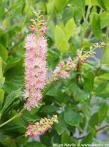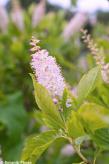Ceanothus x pallidus 'MARIE SIMON'

Ceanothus x pallidus 'MARIE SIMON'
California lilac, hybrid ceanothus
California lilac, hybrid ceanothus
| SIZE/TYPE | medium-sized shrub |
|---|---|
| USUAL HEIGHT | 1-1.5m |
| USUAL WIDTH | 1-1.5m |
| LEAVES | deciduous broadleaf |
| COLOUR OF LEAVES |
 green green |
| FLOWERS | showy |
| COLOUR OF FLOWERS |
 pink pink
|
| BLOOMING TIME | July - September |
| LOCATION | full sun |
| SOIL TYPE | neutral to alkaline |
| SOIL MOISTURE REQUIREMENTS | dry and sharply drained (xeriscape) |
| USDA zone (lowest) | 6 (down to -23°C) |
| WINTER PROTECTION | |
| FOR ZONE 5+6 |

|
| FOR ZONE 7 |

|
| BELONGS TO CATEGORIES |
Deciduous broadleaf Summer blooms |
Blueblossom or California lilac is a genus of about 55 species. The evergreen are mostly from Mexico and W.USA, especially California, and the deciduous are native to E.USA and S.Canada. They are popular for their true-blue flowers. Only a few evergreen species and varieties can be cultivated in cold C.E. continental climate, always with some winter protection. On the contrary the deciduous hybrids such as c. x delilianus and c. x pallidus and further crosses are happy even here.
Marie Simon is another French hybrid ceanothus, a cross from 1830 between c. x delilianus with blue flowers and c. ovatus with beige flowers. The result is a deciduous shrub with a profusion of soft pink flowers composed in small, fluffy panicles. They come out from late July and rebloom continuously until September. Its leaves are deciduous, narrowly ovate, medium green, partially very glossy, 5-7 cm long, with less conspicuous veins.
It grows moderately or fast if cut back, into and upright and slightly spreading shrub of dense habit. It may stand alone as a handsome specimen but looks best in a mixed border with plants of pastel-coloured flowers. For profuse flowering and a nice shape prune it back every year in spring after all frosts, to low permanent framework, leaving only 10-20% of previous year’s growth.
California lilac is a prairie plant used to drought, sun, and heat. Marie Simon is less demanding as to soil quality compared to other ceanothus species and hybrids. It will even cope with come clay and less fertile ground. Yet for best result we recommend growing it in moderately fertile, well-drained soil of neutral to alkaline pH, adequately moist in its first year. Do not apply fertilizers for faster growth. Nitrogen would enhance production of foliage over formation of flowers. You can use a slow-release or phosphorus-based selective fertilizer for profuse flowering. It needs to be mulched well to be protected from severe temperature swings in winter and spring. Deciduous ceanothus does not require a sheltered position as it will always be hard pruned in spring. Hardy to about -25 °C (USDA zone 5b-6).
Last update 02-12-2020
Marie Simon is another French hybrid ceanothus, a cross from 1830 between c. x delilianus with blue flowers and c. ovatus with beige flowers. The result is a deciduous shrub with a profusion of soft pink flowers composed in small, fluffy panicles. They come out from late July and rebloom continuously until September. Its leaves are deciduous, narrowly ovate, medium green, partially very glossy, 5-7 cm long, with less conspicuous veins.
It grows moderately or fast if cut back, into and upright and slightly spreading shrub of dense habit. It may stand alone as a handsome specimen but looks best in a mixed border with plants of pastel-coloured flowers. For profuse flowering and a nice shape prune it back every year in spring after all frosts, to low permanent framework, leaving only 10-20% of previous year’s growth.
California lilac is a prairie plant used to drought, sun, and heat. Marie Simon is less demanding as to soil quality compared to other ceanothus species and hybrids. It will even cope with come clay and less fertile ground. Yet for best result we recommend growing it in moderately fertile, well-drained soil of neutral to alkaline pH, adequately moist in its first year. Do not apply fertilizers for faster growth. Nitrogen would enhance production of foliage over formation of flowers. You can use a slow-release or phosphorus-based selective fertilizer for profuse flowering. It needs to be mulched well to be protected from severe temperature swings in winter and spring. Deciduous ceanothus does not require a sheltered position as it will always be hard pruned in spring. Hardy to about -25 °C (USDA zone 5b-6).
Last update 02-12-2020
SIZES and PRICES
CURRENTLY SOLD OUT
GLOSSARY
|












